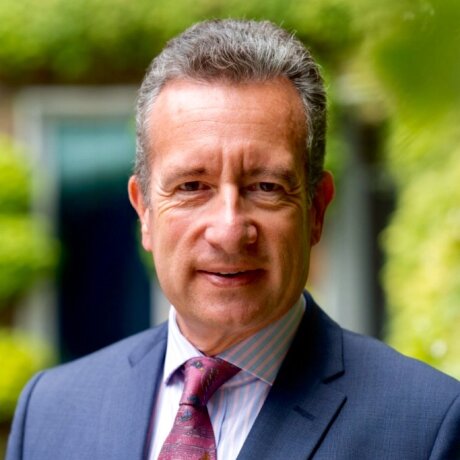
US election, international student policies, new British guideline: C. Cripps on higher ed news
"Four years ago, when Trump was in office, the higher education sector was talking doom and gloom, but now I think people are more prepared to look at opportunities", declares Christopher Cripps, Vice-President for Europe & International Affairs at the Institut Polytechnique de Paris (France), during the News Tank Academic live webinar on 03/12/2024.
The session explores the latest trends and challenges in international higher education and research, focusing on the impact of the evolving geopolitical landscape and global developments on academia.
Circling back on, among other subjects, the US elections, as he is American, Christopher Cripps says: "People are mainly worried about funding for research and programmes such as social sciences, climate change and diversity, about political polarisation and academic free-speech, of being a part of the issues that will arise during a Trump presidency".
As a stakeholder in the higher education and research sector, Christopher Cripps reviews the latest international news potentially affecting universities: Donald Trump's election, the UK
United Kingdom
's return to Horizon Europe and its political and economic situation, and countries across the world capping the number of international students.
The Institut Polytechnique de Paris (IP Paris
Institut Polytechnique de Paris
) is a public technological university in Palaiseau (France). It is composed of six engineering grandes écoles: École Polytechnique, ENSTA Paris, Ensae Paris, École des Ponts ParisTech, Télécom Paris and Télécom SudParis. It welcomes 10,000 students in 2023-2024.
American election: "We will find a way to navigate changes"
After the election of Republican candidate Donald Trump on 06/11/2024, academics around the world expressed concern about what the next four years would be like for the higher education and research sector.
"The top worries are reduced federal funding for national students, students deciding to go elsewhere, major changes in higher education across the US in general, the dismantling of the Department of Education and accreditation systems."
"I have decided that we just have to live with it. The opportunities are here, we need to focus on our resilience. The international higher education community proved it is adaptable, notably during Covid and the last Trump administration, so we will find a way to navigate changes", he says.
The impact on students and student mobility
A QS Quacquarelli Symonds survey on student mobility, published ahead of the American election and facing international students with either presidential result, showed that 50% of Western European students were less likely to consider the US after the Republican win.
"There will be a ripple effect across the world, student mobility will change with new spots like India for example. For us in Europe or Asia, it is a good opportunity to capitalise on that: we can communicate on our openness, our excellent programmes, we are affordable and know how to create opportunities for students across the continent."
Countries capping the number of international students
The higher education sector is also facing the capping of the number of international students by several countries: The Netherlands, Australia, Canada and the UK. A trend that appeared in recent years, even though "student exchange is the heart of higher education", according to Christopher Cripps.
"I work in France, where we have 400,000 international students and 35% of our national students go abroad and it's fabulous", he states.
"In terms of capping, the Dutch started it, it was very surprising, the Netherlands has been the country where students have been going as an alternative to the UK and the US because of their excellent level of English, their courses in English, their excellent programmes and universities…
But we need to understand where these countries come from: they explain it by pressure on housing, public services, the labour market and other political debates around immigration, as always."
A short-term policy trend
Listing the numerous benefits of having international students (financial, economic, cultural diversity, strengthening the global network,…), Christopher Cripps declares that these policies are "what these countries need to be doing now".
"In the end, these countries will realise they can’t keep students out for very long, well-trained minds are needed everywhere to keep up with the world. Germany for example is trying to get more people, they need brain power.
I think these would be short-term policies, lobbying in favour of international students will continue, there are five million students on the move around the world and they won’t change their minds, they will find a spot to go to."
At IP Paris, Christopher Cripps reports a high number of international students (40%), essential for the institution, as they work on new fields of research and need to work with actors across the globe.
The UK reconnecting with Europe
In the UK, international students have been said to increase immigration in the past years. However, after the general election in June 2024, a new Labour government took over, with the ambition to reconnect with the EU and change the general mindset on higher education.
In the last months, they announced new partnerships with EU countries, like France, massive investments in higher education and research and assured the sector that they will not restrict international students.
"What they are investing in R&D Research & development demonstrates a clear ambition of the UK to remain a global leader in innovation and technology. Their return to Horizon Europe is also a very beneficial event for them and the rest of us because they are a major player", states Christopher Cripps.
"Money in internationalisation is an investment"
Universities in the UK are still facing a tough time financially, like in many countries, "but I hope that despite all of that, collaboration is back".
"We hear UK colleagues talking about a shift in the mindset in the UK on what internationalisation is, and this is key because for decades their understanding was that it meant bringing in students or creating transnational education, and there is a financial component that is very important to them.
But in continental Europe, internationalisation is more about European Universities alliances, working together, publishing together, creating opportunities together... We don’t want to lose a lot of money doing that, but those are not losses, they are investments."

Christopher Cripps
Vice President Europe and International @ Institut Polytechnique de Paris (IP Paris)
Visit in the directory
Career
Vice President Europe and International
Adviser on diplomatic relations and international strategy
Director Of International Development
Consultant
Director of International and European Affairs
Director of International Relations
Director of International Affairs
Studies & Diploma
MBA
# 51516, created on 06/05/24 at 18:24 - Updated on 09/12/24 at 17:10
© News Tank Academic - 2025 - French copyright law: "Infringement of copyright (...) is punishable by three years imprisonment and a €300,000 fine. Infringement consists of all forms of reproduction, display or circulation of any intellectual work, in any medium, in violation of the rights of the author."
